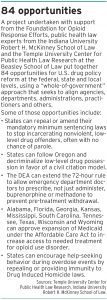Subscriber Benefit
As a subscriber you can listen to articles at work, in the car, or while you work out. Subscribe NowThe devastation wrought by America’s opioid epidemic has been immense, with thousands of overdose deaths, families adversely impacted by loved ones’ addictions, and state and local governments struggling to find funds for treatment facilities and alternative solutions to incarceration.

To Indiana University Robert H. McKinney School of Law professor Nicolas Terry, there are a lot of opportunities available on the federal, state and local level to make significant changes in U.S. drug policy and improve people’s lives.
“Yet we don’t seem to be doing it. We aren’t executing on the programs that may make a dent in opioid use,” Terry, also the executive director of the Hall Center for Law and Health at IU McKinney, said.
Terry is one of several public health law experts from IU McKinney and the Temple University Center for Public Health Law Research at the Beasley School of Law that worked on a project described as a “new, transformational model for U.S. drug policy.”
According to IU McKinney, the project was undertaken with support from the Foundation for Opioid Response Efforts, a group founded in 2018 as a private 501(c)(3) national, grant-making foundation that’s focused on addressing the nation’s opioid crisis.

“This project is filling a critical gap in drug policy work by showing us how policies at different levels and across different sectors can and must work in synergy to reduce overdoses,” Karen A. Scott, president of FORE, said in a news release. “We are pleased to support this important initiative that delves into an entire government approach, looking at what is needed to break down silos and produce effective change.”
Terry said some of the project’s research began in 2018, when IU’s Responding to the Addictions Crisis Grand Challenges initiative was launched and aimed at preventing, reducing and treating addictions throughout Indiana.
“That kind of grew out of that project. Obviously, this is national,” Terry said.
The project includes 84 opportunities for legal changes that are organized in an interactive table available at PHLR.org and are accompanied by six white papers that lay out a new model for U.S. drug policy.
“These are not 84 magic bullets that will be going into effect tomorrow,” Terry noted.
 One of the things the project’s public health experts learned is that different levels of government aren’t always properly aligned and working together when it comes to drug policy reforms and reducing opioid use, Terry said. He described the “vertical hole of government” and the challenges of aligning drug policy between federal, state and local entities.
One of the things the project’s public health experts learned is that different levels of government aren’t always properly aligned and working together when it comes to drug policy reforms and reducing opioid use, Terry said. He described the “vertical hole of government” and the challenges of aligning drug policy between federal, state and local entities.
There can also be horizontal holes, Terry added, like whether the U.S. Department of Health and Human Services is aligned with the Drug Enforcement Agency on a federal level.
Opportunities for reform
The project’s opportunities focus on the following model components, according to IU McKinney:
• Reimagining federal funding of substance use strategies to promote long-term state strategies and coordinated spending.
• Removing the final “war on drugs” impediments from the treatment domain.
• Accepting that harmful substance use is not only a chronic condition but one that requires redesigning health care.
• Building a modern harm reduction system and allowing it to do its job with updated federal and state policies and the removal of structural barriers.
• Identifying and remedying the upstream social and structural determinants that operate both as root causes of substance use disorder and impediments to treatment and recovery.
Terry said researchers used evidence-based ideas to build the model and find opportunities for drug policy reforms.
The 84 opportunities cite a wide range of laws that are already in place.
One recommendation is that states can abandon civil forfeiture in minor drug cases.
Another is that Congress can extend the liberalization of telemedicine policies in the Consolidated Appropriations Act of 2023 that were beneficial in the treatment of substance use and other behavioral health needs — including qualifying providers, geographic and originating site restrictions, and audio-only telehealth services — beyond the sunset date of Dec. 31, 2024.
“We know we’re capable of removing these barriers, or a lot of them,” Terry said. “We proved that during COVID.”
Periodically, Terry said, there are bipartisan efforts to address opioid use on a national level.
He cited the Substance Use Disorder Prevention that Promotes Opioid Recovery and Treatment for Patients and Communities, or SUPPORT, Act, which became law in 2018 and was designed to increase the capacity of Medicaid providers to deliver substance use disorder treatment and recovery services.
But many of the reforms introduced in the SUPPORT Act expire next year, Terry said.
To that end, one of the project’s recommendations is that Congress can make permanent the SUPPORT Act’s state plan amendment option to provide medical assistance for certain individuals who are patients in defined institutions for mental diseases.
Indiana efforts
Terry said the U.S. relies on a “laboratory of the states” in terms of passing laws and seeing how different programs work. Some states, such as Oregon, Washington and California, have been at the forefront of addressing opioid use and trying to come up with policy solutions that provide forward pathways, he said.
Indiana was pretty active in trying to deal with the opioid epidemic from 2017-2019, Terry said, with Gov. Eric Holcomb’s office and the state Legislature trying to move the ball forward with policy reforms and increased funding for treatment facilities.
Still, “I’m not convinced we’re making as much progress today as we would like,” he said.
Terry did give credit to Holcomb and the state’s public health task force on some of the work that’s been done in Indiana to bring awareness and fund mental health initiatives.

Dave Joley, a Fort Wayne attorney with Joley Law Firm P.C. and a member of the National Organization for the Reform of Marijuana Laws’ Indiana chapter, said he thinks the state is a bit behind the curve on some of its drug policies.
He applauded the IU McKinney/Temple project for its holistic look at federal, state and local laws.
“It’s a gigantic ship that they’re trying to move,” Joley said. “I think it’s much needed.”
Joley said he’s heard estimates that between 250 and 300 people a year die from drug overdoses in the Fort Wayne area.
He noted criminal justice reforms introduced in Indiana changed sentencing guidelines to reduce the state’s prison population. That stopped sending as many people to prison, but it also put a lot of pressure on local jails.
Joley said there are a lot of drug policy reforms that could be done right away, like making naloxone more readily available for overdoses and amending regulations to make it easier to administer methadone.
The financial cost of some reforms may give people pause, but Joley said there are also big costs that taxpayers absorb when counties build new, bigger jails.
When it comes to reforming drug policy, he said, everyone needs to be open to finding new solutions.
“Arresting our way out of it isn’t going to work,” Joley said.•
Please enable JavaScript to view this content.
